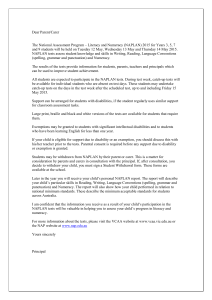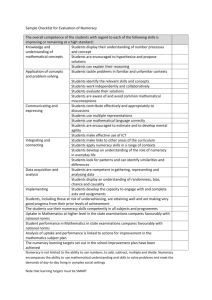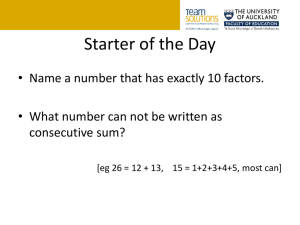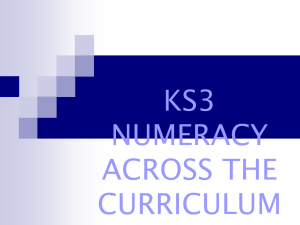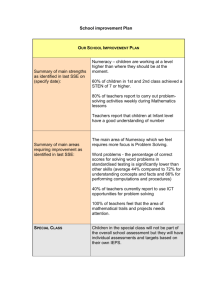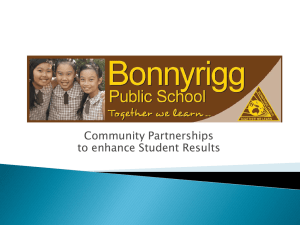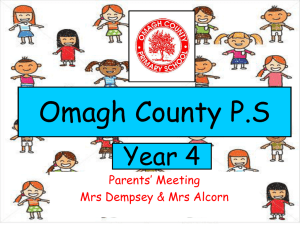FLOREAT PARK PRIMARY SCHOOL Mathematics Annual
advertisement
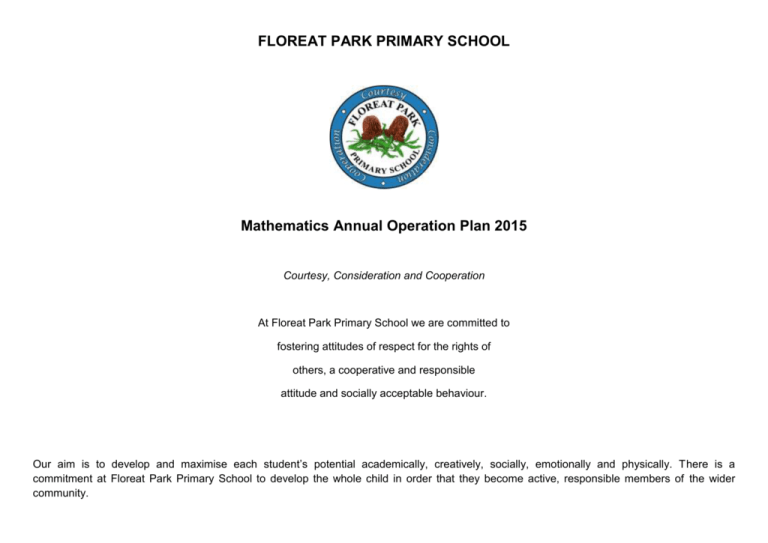
FLOREAT PARK PRIMARY SCHOOL Mathematics Annual Operation Plan 2015 Courtesy, Consideration and Cooperation At Floreat Park Primary School we are committed to fostering attitudes of respect for the rights of others, a cooperative and responsible attitude and socially acceptable behaviour. Our aim is to develop and maximise each student’s potential academically, creatively, socially, emotionally and physically. There is a commitment at Floreat Park Primary School to develop the whole child in order that they become active, responsible members of the wider community. Mathematics Targets Curriculum Team: Robyn Comtesse, Sally Cousins, Jayne Prentice, Caroline Priskitch, Gemma Rennie 2015 – 2017 Floreat Park Primary School Business Plan Targets NAPLAN progress and achievement - Maintain or exceed year 5 students’ numeracy results compared to statistically similar schools. - Increase year 3 students’ numeracy results compared to statistically similar schools Pre-primary On-entry assessment - Literacy: by the start of year 1 students will achieve an average cohort score of 1.0 VELS - Numeracy: by the start of year 1 students will achieve an average cohort score of 1.0 VELS Page 2 FPPS Mathematics Operation Plan 2015 Saved: S Drive; 2015; 100 Administration; 108 Planning; Operational Plans; FPPS Mathematics AOP 2015 FOCUS AREA Classroom Management and Instructional Approaches Balanced numeracy programs Uninterrupted numeracy learning blocks Numeracy teaching and learning across curriculum areas Scaffolded learning Recognition of difference Grouping learners Time allocation Opportunities to observe and practise Explicit teaching Actions You will see teachers: Recognise and cater for individual differences using NAPLAN, On Entry Data, Individual Education Plan, student folders & handover files. Provide an uninterrupted block of time for numeracy. (50% of instruction time on literacy & numeracy) Use Australian Curriculum documents & DET Portal online resource materials to develop balanced numeracy programs. Use First Steps in Mathematics & imaths to promote a whole school focus and common approach to numeracy. Use common instructional learning strategies, explicit teaching & Wistar to support numeracy learning. Use Mathletics to extend student learning and consolidate skills. Use NAPLAN planners and resources to prepare for NAPLAN testing. Provide opportunities for students to develop skills in the Proficiency Strands. Incorporate General Capabilities into mathematics programs. Incorporate Cross Curricular priorities Evidence to support You will see students: Engaged in numeracy learning where possible across multiple learning areas. Working individually, in small groups and as a whole class during numeracy learning. Working at appropriate developmental level. Mathematics Resources – equipment and texts (imaths) First Steps Numeracy resources SAER co-ordinator to assist teachers with compilation of IEPs/GEPs for identified SAER students First Steps Numeracy resources Interactive Whiteboard resources Engaged in common cooperative instructional learning strategies K-6. Reaching targets outlined in this document. Completing set tasks using electronic learning resources including completing tasks at home. Demonstrating the A/C Proficiency Strands of Understanding, Fluency, Reasoning & Problem Solving when engaged in mathematic activities. Developing the skills, behaviours and attributes of the A/C General Resources What resources are available? NAPLAN, On Entry Data, Student Achievement Information System NAPLAN resources Australian Curriculum documents (online) and Floreat Park (year level) Maths Files Online resources; Number Shark, Mathletics, Studyladder, The Learning Federation Resources & maths apps for ipads Page 3 FPPS Mathematics Operation Plan 2015 Saved: S Drive; 2015; 100 Administration; 108 Planning; Operational Plans; FPPS Mathematics AOP 2015 into mathematics programs. Differentiated curriculum Use of Floreat ‘Scope & Sequence’ Planner. ( Floreat Park Maths Files) Capabilities that students need to succeed in life and work. Consistent approaches Evidence-based Systematic practise Focus on developing an understanding rather than shortterm recall or memorisation of procedures Use of data to inform & refine practice Use of information and communication technologies Use maths investigations to create a whole school maths display. Use whole school instructional learning strategies to support numeracy learning. Use information technology to enhance student learning. Use NAPLAN data to inform and refine practice & to guide whole school curriculum planning. Receive support for SAER students. Use explicit mathematical language. Become familiar with A/C Achievement Standards as in Floreat Park Maths Files. Work and plan collaboratively using Wistar lesson structure to promote connected practice. Teaching and testing basic facts on a regular basis. Explicit teaching of mental computation strategies K-6. Develop understanding in mathematics related to the A/C Cross Curricular priorities. Use ICT resources to extend and consolidate maths understandings. Showcase their learning to parents on Learning Journey Night. Mastering essential numeracy & language skills. Engage in authentic tasks, games and investigations that require thinking and understanding rather than memorisation. Given the opportunity to talk, report, display and explain their knowledge. Working in cooperative groups. Displaying a positive attitude towards mathematical learning. Given the opportunity to reflect on lessons. Using a range of technology to assist with problem solving. Using hands on, concrete materials to assist with problem solving and abstract ideas. Able to use a range of strategies to solve the same problem. Use of Dr Paul Swan resources Australian Curriculum First Steps Number resources Online Resources Inclusive practises Page 4 FPPS Mathematics Operation Plan 2015 Saved: S Drive; 2015; 100 Administration; 108 Planning; Operational Plans; FPPS Mathematics AOP 2015 FOCUS AREA Monitoring and Assessment Systematic monitoring and assessment. Actions You will see teachers: Evidence gatheredAustralian Curriculum Achievement Standards AC Portfolio samples Use of data to focus instruction and address student’s needs Use of data to inform future planning at the classroom and school level Feedback to students SCSA (School Curriculum & Standards Authority) - 6 Assessment Principles. Use NAPLAN data to inform planning for groups and individual students. Evidence to support You will see students: Through performance management, demonstrate that data is used to inform planning for groups and individuals. Use assessment strategies that are valid, educative, explicit, fair and comprehensive. Use analysis of NAPLAN data to inform whole school planning. Use of On Entry assessment in PrePrimary to inform planning and identify students at risk in numeracy. Plan for all students to meet developmentally appropriate Achievement Standards in Numeracy. Use year level FPMF (Floreat Park Maths Files) for moderation assessment tasks. Conduct, collate, record & analyse results for the One Minute Basic Facts Test. Teachers engage in collaboration to make consistent judgements against Australian Curriculum Achievement Standards. Teachers provide effective intervention programs for at risk students. Classroom teachers collaborate to provide effective intervention programs for at risk students. (SAER/TAGS) Resources What resources are available? NAPLAN DoE exemplars SAIS data On Entry assessment data Australian Curriculum A/C Achievement Standards and portfolio samples SCSA Judging Standards & year level pointers UNSW testing Floreat Park Year Level Maths Files AMC maths competition One Minute Basic Facts Test – data collection Whole school maths assessment Page 5 FPPS Mathematics Operation Plan 2015 Saved: S Drive; 2015; 100 Administration; 108 Planning; Operational Plans; FPPS Mathematics AOP 2015

